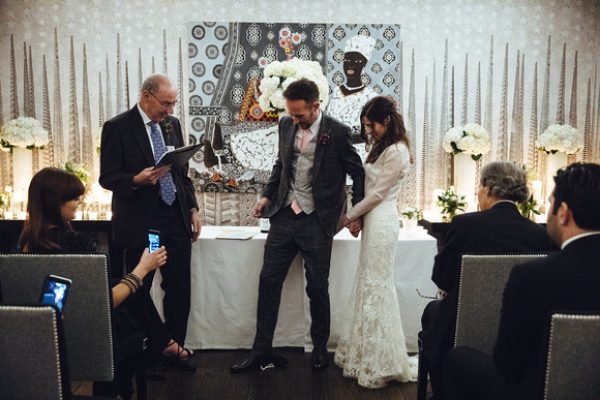
by Michael | Apr 12, 2018 | Blog
Choosing a celebrant is a bit like choosing a plumber. Without a personal recommendation, you have to go by the website – and instinct. If you get your choice wrong, it can be costly in more than one way.
So, unless you know someone who has already used the celebrant, the website is the first port of call.
Website
You will probably find some testimonials there. Take time to read at least a few. You can get a good idea about the celebrant’s service from them.
You can ask to be connected with people who have already used the celebrant’s services. That’s a good beginning.
There may be photos or videos on display. These will help you to ‘get to know’ the officiant a bit. If you’ve taken a dislike to the celebrant at this stage, don’t go any further with them. You will need to get on with and feel at ease with them – especially on the big day.
Direct contact
You should of course contact the celebrant – and arrange either a face-to-face meeting or a Skype call. That should cost nothing, so you are not committed at that stage. Following that initial conversation, you will be able to answer two vital questions:
- can the celebrant communicate well? Can they speak well and also listen well?
- do you feel a rapport with them? Are they friendly, experienced and professional?
You may have plenty of questions. That’s fine. You may want to be led by the hand and take advice every step of the way, or you may prefer to insist on all the details yourself. Usually, it’s a combination. What matters is that you are happy with the outcome.
What you need to know
You should receive clear information about the celebrant’s terms and conditions. You will need to know the celebrant’s method of working with you. Cheapest is not always best, of course, and you will have to judge what you can afford to pay.
By all means, compare a couple of celebrants. Don’t let price influence you unduly. What really matters for your special event is whether the celebrant can deliver exactly what you want. You don’t want compromise.
Ideally, your celebrant will allow you to create your perfect ceremony, guiding you clearly and inviting your full participation. He will then conduct the ceremony professionally, memorably and with warmth.
If you follow these tips, you should be sure of receiving the greatest assistance and satisfaction in the build-up to what is certainly the most important day in your life.
Guess what? Michael can help you, and is just waiting for you to contact him!
Photo: www.lyndseygoddard.com
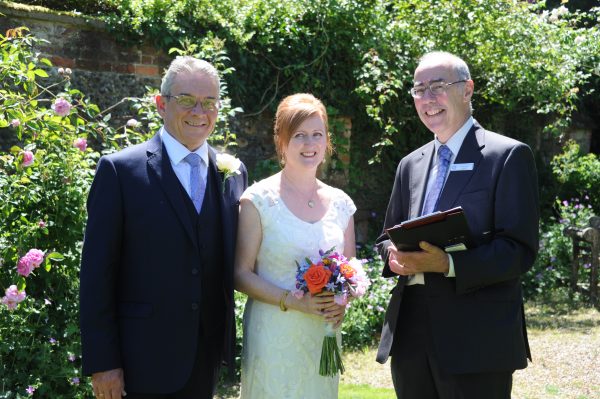
by Michael | Apr 12, 2018 | Blog
Of course, everybody wants a happy and successful wedding. But such a result does not come without careful planning.
That applies whatever your budget.
Suppliers
You will probably be using caterers, flower-arrangers, photographers, a DJ and possibly a wedding-planner and – hopefully! – a civil celebrant like myself.
It makes sense to get quotes from two or three of each before committing. Cost will matter, but should not be the critical factor (see the next paragraph). If you don’t have any first-hand referrals, look at testimonials, but definitely don’t neglect some kind of personal contact. This allows you to get to know the supplier as well as to ask questions before committing. Allow time for all this.
Depending on your budget, you should ensure you do not stint on what really matters to you. The venue, wedding dress or the catering could be the most essential component to you both. To ensure you get exactly what you want may mean reducing costs elsewhere – eg the guest-list, venue size, the flowers, etc. Just make sure you and your partner are in agreement and are not inadvertently preparing a rude shock for the other!
Saving money
Sometimes, using a less common venue (park, zoo, beach, field) can reduce your fees, but still fit the bill completely.
If you go for a wedding lunch, rather than dinner, this may reduce costs. Moreover, the season will have an effect. Summer, Christmas and Valentine’s Day can be more expensive times, for example.
Do ensure any wedding-planner, celebrant or venue knows exactly what your desires are (in good time). Make a list, and bear in mind you may want to arrange accommodation at the venue (possibly for guests from further afield as well as for you). (You might be able to negotiate a special price too!)
So, plan, plan and plan. Make notes, ask questions, take advice and build a perfect day for yourselves and your guests. Ensure you know what you really want. This will be the day when your every desire must be fulfilled!
For further help, speak to Michael!
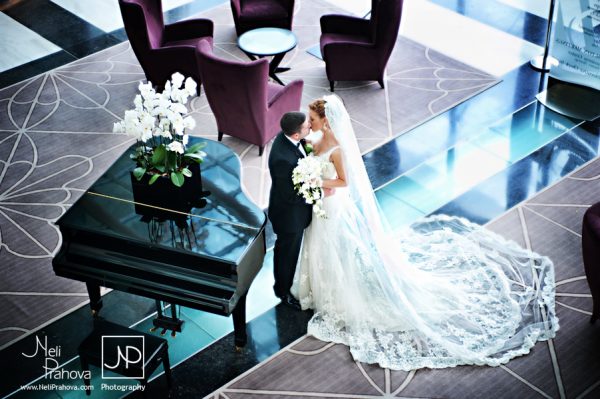
by Michael | Apr 11, 2018 | Blog
Don’t believe anyone who claims that wedding music does not play an essential part in the proceedings.
Whatever the tone of the ceremony (formal, semi-formal or informal, traditional or modern), music can make a huge difference to the character and atmosphere.
The final choice of music has to be down to the couple themselves. However, as celebrant, I am occasionally called upon to give advice or guidance. The following are my own thoughts, but, of course, are only general in nature.
Music – when?
The ‘normal’ places for music are during the Processional (as the bride comes in) and the Recessional (when the couple walk out at the end). If you’re having a signing of the Register, that can also be a good time for music.
However, you can air a piece of music as part of the ceremony. Perhaps you have a trained opera singer as an aunt, or know a child-prodigy violinist. Or you may want to play some recorded music that means a lot to you both.
You may opt for music either side of the vows, although that is less common.
There could certainly be music while guests are waiting before the ceremony. Your choices will set the tone for what follows, so think about this too.
But beware of too much music – the ceremony (however beautiful) shouldn’t go on for ever.
Music – which?
Wedding marches are commonly played at the Processional and Recessional. But there’s no obligation to use these.
The music does not have to be classical, of course. It can be any genre, depending on the wishes of the couple. Indeed, there may be good reasons to choose music from other cultures, and this can be fascinating as well as moving for guests.
For a religious ceremony, you will probably want a hymn or two.
Baroque or Classical composers’ music (eg Bach, Handel, Beethoven) is often played during the signing of the Register. Make sure these pieces are long enough.
Music – how?
Live music can make a ceremony very special indeed. It can be quite costly, of course, but, as long as musician(s) and celebrant agree beforehand when the music is going to be played, this can be a lovely touch.
A PA system comes cheaper, naturally, but a lot of reliance will then need to be placed on both the audio equipment and the operator.
To ensure smooth running of the ceremony, a rehearsal (with musicians/audio equipment) can be recommended, although responsibility for paying for this would be the couple’s.
Music – why?
Music heightens the emotions and gives meaning to the moment. It will help bring about a wonderful feel-good sensation and contribute to ensuring that the ceremony will be memorable for all the guests and a highlight of the couple’s life together.
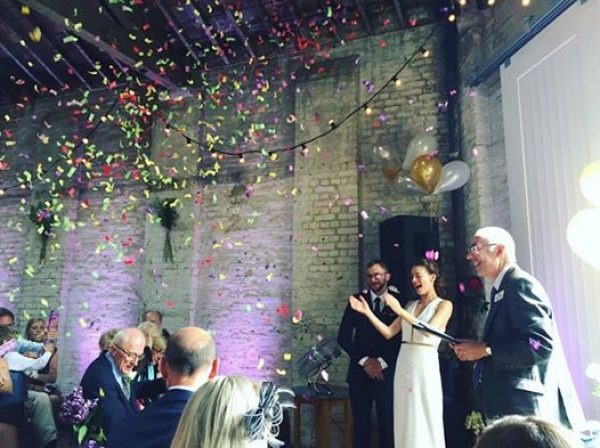
by Michael | Apr 11, 2018 | Blog
For (nearly) 250 years the US has existed independently of the United Kingdom. That time has witnessed many changes. Language is one example (“faucet” for “tap”, “diaper” for “nappy”, “sidewalk” for “pavement” – you name it, the list seems endless).
Bridal traditions have also changed.
Language
In some cases with these traditions, it’s only a matter of language too. So the “bachelorette party” is better known in the UK as “hen party” and the “bachelor party” as “stag do”. Furthermore, the “Maid of Honour” is often referred to as “Chief Bridesmaid” over here, and “Groomsmen” as “Ushers”. As a “Civil Celebrant” myself, I have had to become aware of the American version of my job-title, which is “Officiant”.
Conventions
Other (non-verbal) traditions include no bridal showers in the UK (although they are beginning to catch on, I think).
Invitations can be different. In the UK there may be two types: one, attend everything; the other, just come for the reception. In the US, the invitation will include ceremony and reception.
The Ceremony
One significant difference is the processional. At the start, in the UK the bride walks down the aisle followed by her bridesmaids; in the US the bridesmaids precede the bride.
There also tend to be more bridesmaids in the US (on average 5) compared to those in the UK (3).
For the processional, US bridesmaids and groomsmen pair off and enter together; in the UK the ushers are often waiting with the groom.
Often in the UK (but almost never in my ceremonies!) the groom faces the celebrant with his back to the guests; in the US he will face the guests as the bride comes down the aisle.
Another difference at the ceremony is the wedding party. In the US, they stand with the bride and groom during the ceremony, whereas in the UK they sit with the guests.
Post-ceremony
After the ceremony, there is likely to be a bouquet or garter toss in the US, but not over here. Only in the US can you expect a dance for the parents (formally announced).
Finally, the Americans will include toasts by the bride’s father, maid of honour and Best Man, whereas over here there are normally major speeches by the father of the bride, the groom and the Best Man (and, nowadays, sometimes, by the bride).
Although we have so much still in common with our American “cousins”, a lot, as we can see when we look at the bridal traditions, is different too.
Variety is, as they say, the spice of life.

by Michael | Apr 9, 2018 | Blog
I deal in unions. Not trade unions, but matrimonial ones. As regular readers will know, I compile and conduct ceremonies, many of which are weddings.
As part of my work, I therefore find myself at different venues all the time. What a variety I have experienced! Some have been outdoors: Stonehenge was so memorable, but, in a different way, so were a canal-side glade, and a barn wedding in a rainstorm. Indoors, I have conducted a Vow Renewal for a couple plus photographer (no guests) in a lovely private hotel room; then there was a wedding at the Savoy with 200 guests…
I’ve also viewed some venues, so as to be able to make recommendations to clients.
I was invited to Chelsea Football Club because, unbeknown to me, that is a wedding venue. Perhaps I would be able to partner with them?
One problem that immediately arose is that I am a Tottenham supporter! Would I want to make a union with such a rival? It is true that I compiled and conducted a funeral service for an avid Chelsea fan a few years back. I even suggested the Chelsea anthem “Blue is the Colour” for the ceremony, and this was agreed upon. Mind you, leading the actual singing was a step too far!
However, the recent result when Spurs travelled to Chelsea (in my wake) emboldened me, and I have decided to publicise my allegiances!

What I have to say, though, is that the venue is stunning. There is a whole range of rooms of differing types available. I hope my amateur photos give an idea of what I mean. If you are a dyed-in-the-wool Chelsea supporter, I can’t emphasise how much you are likely to enjoy having your celebration there.
And they know what they’re doing. The wedding organiser I met couldn’t have been pleasanter and more on-the-ball (if you’ll forgive the pun!).

Do pay them a visit and see for yourself.
For other suggestions in the Greater London area, do please contact me.

Of course, I’m waiting till White Hart Lane is finished. I expect an invitation!
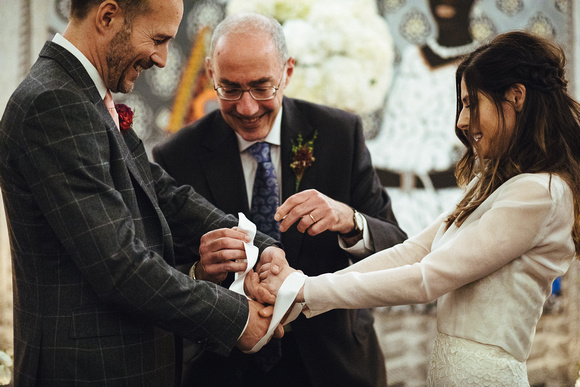
by Michael | Apr 3, 2018 | Blog
It may sound a bit bizarre that I am writing about humour at weddings. However, ceremonies like these don’t have to be solemn all the time. That’s not to say that there aren’t parts that probably should be.
Apart from making the atmosphere lighter, humour can cause the ceremony to be more personal and memorable. (Incidentally, I’m referring to intentional humour here!)
Of course, the celebrant can contribute with touches of wit (as long as he accepts that the ceremony is not a stand-up routine!). But the point is that the whole event is actually about the couple up there with him.
One area where the bride and groom can show their individuality and humour is the vows. Instead of – or in addition to – traditional vows, the couple can write their own.
These are public declarations, so should be primarily serious and sincere. However, the dose can be lightened with a spot of humour. This will help reveal the personality of the pair.
You don’t have to write masses (in fact, less is good). Quite often, the vows can be promises. Some will say what you will do; others what you won’t do. Season with a little humour.
What about a few examples of humour?
Groom: I promise not to leave my empty beer cans in the lounge overnight. I promise not to go out to the pub every night. Not every night.
Bride: I promise to learn to cook at least two different dishes by the end of next year.
Groom: I promise not to leave my shoes all over the hallway. I even promise to take my shoes off when I come in …
Bride: I promise to wait until after the wedding day to tell you what I think of those shoes.
Groom: I promise to ask a passer-by the way, if I get lost.
Bride: I promise we won’t see my parents excessively. Of course, they may visit us the weekend we’re not with them.
Groom: I promise not to clean my football boots in front of the television. I promise not to keep the take-away in business single-handed.
Bride: I promise not to cancel the Sky Sports subscription without at least a day’s warning.
Groom: I promise to allow you to go shopping at least once when we’re on holiday.
Bride: I promise to make you proud of me by buying a lovely new handbag every month or two.
Groom: I promise to look interested when you tell me about your day.
Bride: I promise to care for you tenderly if your illness is neither man-flu nor hangover-related.
You can work individually or together when writing your vows. The effects may be fascinating!
So don’t go thinking that humour is out of place at a major ceremony. It is if the humour is insulting, offensive or derogatory. Otherwise, be prepared to use it judiciously, and your ceremony may well stand out even more.
For more advice, please contact Michael
Photo: www.lyndseygoddard.com









